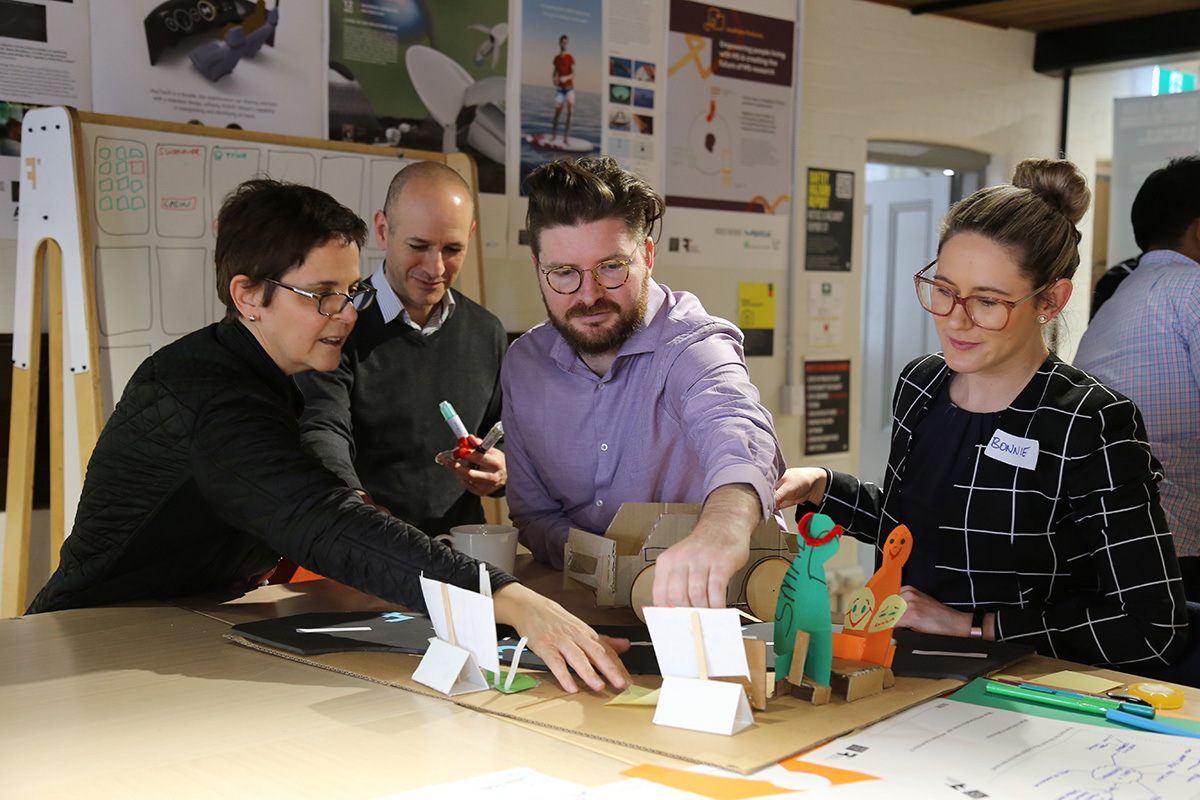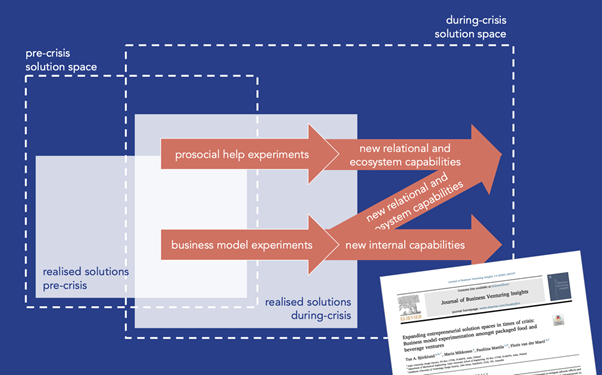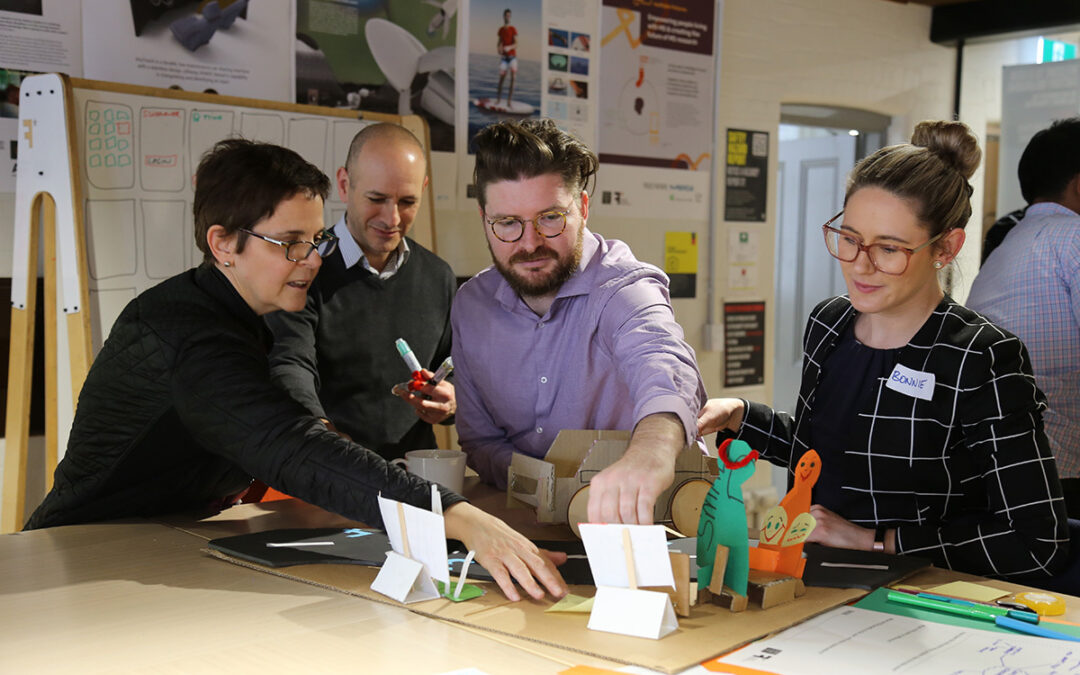Keep Experimenting – Especially in a Crisis!

The Covid-19 pandemic and emergency measures have had a global impact, disrupting the production, sales, distribution channels and consumption patterns across sectors and regions.
Being interested in creativity and innovation processes at Design Factory Melbourne, these times provided us with an opportunity to look at how organisations might stay innovative in a crisis context. Teamed with researchers from Aalto University in Helsinki, Finland, we wanted to better understand how an organisation can navigate through turbulent times and what their actions are for survival. How does one retain their business and what actions spark innovation and creative outcomes?
Sweeping across the globe, the pandemic has caused disruption in many sectors in an unprecedented way. A common response by companies would be to play conservatively and minimise risks in order to preserve the business as usual. However, our research into the responses by Finnish food and beverage entrepreneurs in their business models challenges that assumption. In our research, we investigated social media responses from 66 ventures from the packaged food and beverage industry in Finland and interviewed a subset of 17 of their founders.
We found that companies were active experimenters right away when the pandemic hit. For example, a dessert company created a new chocolate pack aligned with seasonal themes that took place during stay-at-home orders. Founders recalled that it only took 48 hours from the initial idea to concept photos published on their social media channels. A brewery bundled their existing products in a more commercial format to increase their sales and were surprised by the success as the customers found the purchasing experience easy and convenient.
Facing the constraints imposed by reducing the spread of Covid-19 pandemic, entrepreneurs quickly responded and experimented across all areas of their business. By leveraging existing resources and acquiring new ones, they created new offerings, operations and partnerships.
For example, a modern distillery faced severe losses in sales as restaurants closed and events were cancelled. Instead of laying down staff to cut costs down, they created new value offerings (capturing of the value proposition of a firm, their target customers and their strategic positioning in the market) to compensate for the plummeting alcohol sales. They created a novel product category by starting to produce hand sanitiser. Doing this also required experimenting in value architecture (core competencies and resources of a firm, organisational structure, distribution channels) with novel supply chains and production methods, as well as new revenue and cost models (a way a firm generates income and manages its costs). All these experiments led to further trials with new delivery models and partnerships that would not have been possible with their original products.

Through analysing entrepreneurs’ actions, we discovered that rather than conducting isolated experiments, several elements were typically bundled together. Initial responses often led to further action, sparking repetition, iteration and scaling of efforts, building on what entrepreneurs learned from the initial experiments. These initial actions serve as stimulating experiments in developing and revising entire business models. They promote a virtuous cycle of action, which further expands potential future solutions accessible to entrepreneurs.
What this means is that although the thought of introducing a new product, service or process to the market, for example, may initially sound risky to pursue especially in turbulent times, acquiring new information through a series of small experiments can create a relatively low-risk pathway to doing so.
Our research suggests that not only were ventures active experimenters during the crisis, but experimenting was also away to thrive in tough conditions. In fact, many entrepreneurs described the crisis lowering the threshold for experimentation as it created a sense of urgency and a mandate to try out new things.
Despite severe hardship, crises can foster innovation, and experimenting is a way to de-risk the exploration of these unknown conditions and directions. Even if an experiment doesn’t result in immediate business benefits such as increased sales, the organisation gains something worthwhile such as invaluable information on the market or a new expertise area, always expanding their solution space (represents the range of potential solutions available to a venture, of which on a portion is actualised in any given moment). One of the coffee roastery founders’ comment captures well the value of experimentation efforts:
“You just have to keep moving, do things, be present and show that you’re alive and everything is happening, that might provide some bigger things over time.”
“The corona situation has made it very concrete that we have to come up with things, and try things out.”
From our findings, we identified four different ways how organisations through experimenting create solutions or increase the capacity to create solutions in the future.
- The first pathway extends the solution space directly through new products, services, production, sales solutions and so forth.
- The second pathway relates to the expansion of the solution space as it extends ventures’ internal capabilities such as learning new domain-specific skills and knowledge or gaining new insights on the direction and processes of the venture.
- The third pathway increases capacity through relational and ecosystem capabilities. That means growing networks with new contacts and diversifying and deepening interactions with existing ones.
- Finally, the fourth pathway builds relational and ecosystem value creation capabilities through experiments in prosocial help.

Global crises, despite their adverse effects, can create opportunities for value creation. Through experimenting, entrepreneurs can manage the immediate crisis by maintaining their operational viability through searching for alternative revenue streams but also further enhance their resiliency through increasing the amount of potential solutions and the capacity to execute on them.
Predicting the value and originality of new ideas is difficult without actioning on those ideas and seeing the results. Experimenting and taking action in small steps creates new knowledge, skills and resources that inform us whether subsequent efforts should be discontinued, modified or scaled.
This suggests that when in doubt, entrepreneurs may be well served by action rather than inaction.
Experimentation allows us to gain crucial knowledge to speed up our decision making. Especially in certain conditions when only a limited amount of information is available to us, it offers an important feedback loop of informing what to do next rather than making those decisions based on assumptions. Experimentation can be a pivotal activity to stay in control of the situation rather than predicting uncertain events.
In the future, organisations shouldn’t wait for a crisis to lower their threshold for experimentation. Even incremental and trivial experiments can serendipitously lead to radical innovations and directly benefit the company. In addition, early experiments – even those seemingly superfluous or trivial – can lead to a lasting competitive edge through action-based learning and capability building, which increases the potentiality of capturing benefits in the future.
Specifically, organisations should look for partners to share experiments. Collaborative experiments not only benefit the development of an organisation’s internal capabilities but also allow the extension of resources collectively for all organisations involved, further expanding the potential for future joint value creation and ecosystem resilience. As such, they initiate virtuous spirals of co-development with shared learning, which results in more innovative and connected enterprises.

